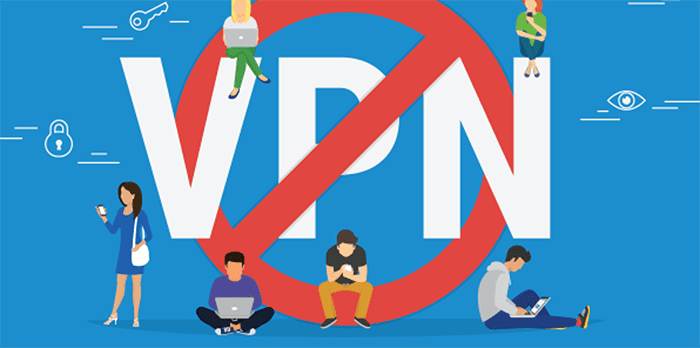
More and more people turn to VPNs and VPN usage is expanding in popularity. While VPNs accelerated, blocks on VPNs came into question for authorities. People prefer VPNs to bypass Internet restrictions. As we know that many countries block access to specific websites, the public attention to VPNs has increased. For instance, governments’ basic purpose to restrict Internet usage in their countries is to protect their cultures and management principles.
We have all heard about social media censorship in China and Russia. The governments thought that some social media applications harm their people and started to use their ruling power to ban some websites. But, governments are not the only authority that is putting restrictions on access. Schools, universities, and corporations are the main restrictors of the Internet environment.
Table of Contents
VPN Against Censorship
The underlying cause of this implementation in these institutions is to restrain Internet usage except for institutional activities and increase productivity. Managers do not want their employees to get distracted due to social media. Likewise, school administrators aim to avoid specific content except that it is educational. On the other hand, workplaces put restrictions to improve their compliance with the regional rules of law. Also, they aim to protect their financials at a stable point. Although purposes have been diversified, all the authorities can restrict website access.
But these restrictions could not stop people from accessing websites as they wished. The main tool that people use to overcome censorship is the VPN. Since some VPN services provide a wide range of locations and connect people to the Internet from various places, the restriction’s effects have faded. While VPNs became popular this much, VPN blocking attempts have increased in the same way. People find ways to access restricted websites by using VPNs so authorities find ways to block them.
What is VPN Blocking?
VPN blocking refers to VPN tunnel prevention by using several strategies. When VPN has been blocked, people can not access definite content or websites. Governments restrict VPNs to protect their strict rules. Furthermore, they use censorship to avoid opposing media content that poses a risk to their ruling. Likewise, organizations avoid VPNs due to conserve their copyright and corporate identity.
From governments to schools, authorities give importance to VPN detection. They use some tools that can detect VPNs. So, they can prevent users from bypassing restrictions by using a VPN.
Ways To Bypass VPN Blocks
As there are many ways to block VPNs, there are also many methods to beat blockers. You can discover the most efficient methods that are used to bypass VPN blocking below. They help you to conceal your VPN connection and make you undetectable virtually.
Use a Static IP Address
There are two types of IP Addresses fundamentally: Static IP address and shared IP address. A static IP address means the IP address is used by one person or one organization. Furthermore, the static IP address is devoted to this person/organization and does not change. So we can say that the static IP address is unique, devoted to a single person, and does not change over time.
On the other hand, there are shared IP addresses that are used by many people and change constantly. As all the IP addresses function to achieve the same purpose, they have advantages over each other. From the business point of view, companies need safe access to resources. Especially for their remote workforce, they should adopt further protection methods. To provide a secure and effective working environment for their employees, companies should use static IP. As we mentioned above, static IP is unique and only used by specific ones. So companies can be sure that their IP address can not be used by third parties and that they do not get harmed because of that.
When VPN is the matter, we can still recommend static IPs. Since Internet Server Providers (ISPs), institutions, and governments can detect VPN usage, people should be careful when using VPN. Static IP can be the solution to your VPN problems.
The main cause of blocking from the websites is that servers consider your shared IP address suspicious because it has been used by many people. ?magine that the specific VPN provider assigns all its users to a specific location, let’s say somewhere in Germany. When people from different locations try to access a website by using the exact same IP address, servers consider them as a danger. Consequently, the website blocks them from reaching out, at least slowing down their access. On the other hand, VPN with static IP seems less suspicious to the websites. Because it has been used by a single person and does not take attention.
Port, Encryption, and Protocol Changing
Maybe the reason for your VPN blocking is your tunneling protocol. If you use a specific VPN protocol it has a high possibility that websites detect your protocol and take it to the blacklist. To fix this issue, you can try to change your VPN protocol in the Settings panel of your VPN application. When you switch your protocol with the different and less used tunneling protocol, you may continue to use your VPN server without a problem.
Encryption algorithms are also decisive when it comes to VPN blocking. Using a different algorithm for encryption can help you to get around VPN blocking. It may be a good and simple way for you to fix your blocking issues. You can manually pick a different type of algorithm and pursue your VPN journey.
You can also evaluate the port options that are used by VPN protocols. It can also be done manually. You can adopt different VPN tunneling ports even if your default ports are specific. Although these techniques can work and you can do it yourself, getting help from a professional is always a better idea. So, be sure that your VPN provider assists you with these kinds of demands.
In Conclusion
We all know that VPNs are indispensable in this era. It is quite common and from large-sized organizations to individual users, VPNs have been used for different purposes. VPN blocking has emerged to avoid the limitlessness of VPN usage. As various institutions aim to restrain Internet usage for different reasons, they use VPN detection methods. While this happens, there are several legal ways to bypass VPN blockers such as static IP, protocol changing, switching to another VPN provider, or using mobile data. So, even if your access has been restricted by the authorities, you can still properly use your VPN.

